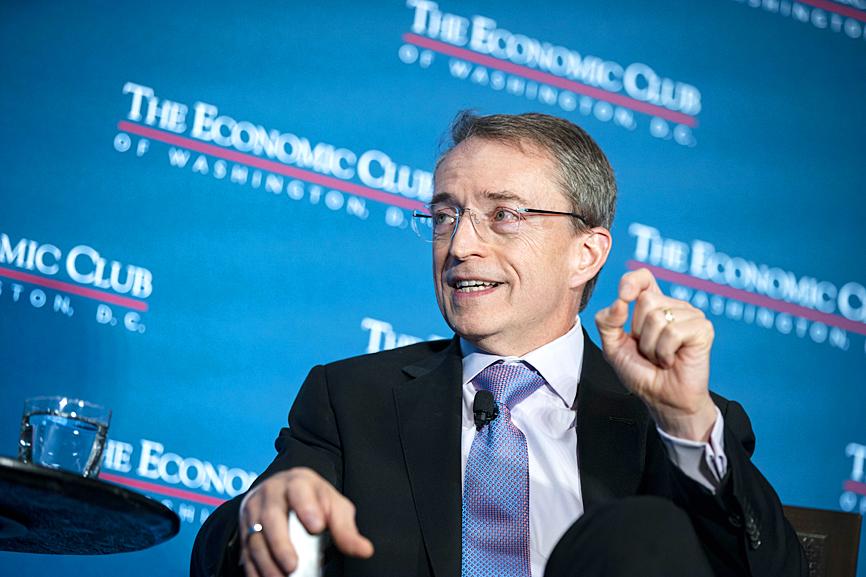Intel Corp CEO Pat Gelsinger is to visit Taiwan and Malaysia next week for talks that show how manufacturing in Asia is crucial to his efforts to turn around the fortunes of the world’s largest chipmaker by revenue.
Gelsinger’s trip is to include a meeting with leaders of Taiwan Semiconductor Manufacturing Co (TSMC, 台積電), people familiar with his plans said.
Intel needs TSMC’s advanced manufacturing services and plans to compete with the Taiwanese company in the foundry business, a tricky balancing act for the CEO.

Photo: Bloomberg
This is Gelsinger’s first trip to Asia since taking the top job at Intel earlier this year and comes as he publicly lobbies the US government to allocate money for the country’s chip industry to domestic companies only.
He has said that overseas manufacturers — such as TSMC and Samsung Electronics Co, which both have plans to build plants in the US — should not get money through the Chips Act, which is going through political approvals in Washington.
As part of those efforts, he has said that the concentration of advanced manufacturing in Taiwan is a strategic risk.
TSMC is both a threat to Intel and an interim solution to issues that have seen the US giant lose manufacturing leadership in the chip industry, the foundation of its dominance for three decades.
Rivals such as Nvidia Corp and Advanced Micro Devices Inc use TSMC’s production to make chips they say are better than Intel’s offerings. Market share losses and weak earnings from Intel have helped bolster their case.
Part of Gelsinger’s answer to that is a strategy for combining parts of processors made by TSMC with other contributions from his own factories to produce more competitive computer components.
At the same time he is investing heavily to improve his own production to the point where he should no longer need TSMC’s cutting-edge production.
He plans to open factories that would make semiconductors for other companies, which is the foundry business model that TSMC pioneered.
While that gives TSMC some leverage, it is also left with some tricky decisions. The kind of production that Intel wants, and the huge volume of orders it could provide, are potentially lucrative for the Taiwanese company. Intel still has about an 80 percent share of the computer processor market.
Gelsinger has said that competition and cooperation between companies is nothing new and technology is full of such arrangements.
Intel has long used TSMC for manufacturing of less-important support chips for computers and other parts of its portfolio.
TSMC’s rapid rise has been built on navigating the complex web of rivalries among its customers, of guaranteeing impartiality and of pushing forward production technology quickly. Its customers include Apple Inc, Qualcomm Inc, Sony Group Corp, as well as Nvidia and AMD.
Gelsinger is also to visit Malaysia, where COVID-19-related shutdowns of plants have hurt chip supply for many companies.
Intel relies on the Southeast Asian country for some of its chip packaging operations, the critical last step in the semiconductor manufacturing process.

South Korea’s equity benchmark yesterday crossed a new milestone just a month after surpassing the once-unthinkable 5,000 mark as surging global memory demand powers the country’s biggest chipmakers. The KOSPI advanced as much as 2.6 percent to a record 6,123, with Samsung Electronics Co and SK Hynix Inc each gaining more than 2 percent. With the benchmark now up 45 percent this year, South Korea’s stock market capitalization has also moved past France’s, following last month’s overtaking of Germany’s. Long overlooked by foreign funds, despite being undervalued, South Korean stocks have now emerged as clear winners in the global market. The so-called “artificial intelligence

‘SEISMIC SHIFT’: The researcher forecast there would be about 1.1 billion mobile shipments this year, down from 1.26 billion the prior year and erasing years of gains The global smartphone market is expected to contract 12.9 percent this year due to the unprecedented memorychip shortage, marking “a crisis like no other,” researcher International Data Corp (IDC) said. The new forecast, a dramatic revision down from earlier estimates, gives the latest accounting of the ongoing memory crunch that is affecting every corner of the electronics industry. The demand for advanced memory to power artificial intelligence (AI) tasks has drained global supply until well into next year and jeopardizes the business model of many smartphone makers. IDC forecast about 1.1 billion mobile shipments this year, down from 1.26 billion the prior

People stand in a Pokemon store in Tokyo on Thursday. One of the world highest-grossing franchises is celebrated its 30th anniversary yesterday.

Chinese artificial intelligence (AI) start-up DeepSeek’s (深度求索) latest AI model, set to be released as soon as next week, was trained on Nvidia Corp’s most advanced AI chip, the Blackwell, a senior official of US President Donald Trump’s administration said on Monday, in what could represent a violation of US export controls. The US believes DeepSeek will remove the technical indicators that might reveal its use of American AI chips, the official said, adding that the Blackwells are likely clustered at its data center in Inner Mongolia, an autonomous region of China. The person declined to say how the US government received